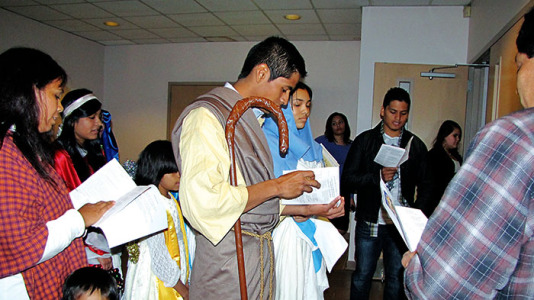By Elsa Baughman
JACKSON – The Posadas is a very old Catholic tradition that, according to historians, started in Spain and was brought to America when the Spaniards first came to the new continent. By the sixteenth century the missionaries had started celebrating this ritual in México with the intention of catechizing the native Aztecs by representing the story of the birth of our Lord.
The Spanish word “posada” means shelter. Jesuit Father Eduardo Pinzón Umaña recounts in his book, “In the Name of God we Seek Shelter,” that in the month of

JACKSON – Dilan Sánchez and Jordaine Piernas played the part of Joseph and Mary during the representation of las Posadas last year at the Christmas Eve children’s Mass at St. Therese Parish. (File photo by Elsa Baughman)
December, during the nine days of the bloody feasts of the Aztecs, the Spanish missionaries introduced the novena of Christmas they called Posadas. Throughout the years this tradition became “ … nine nights in which the community of faith walked in procession from house to house in the neighborhood asking for posada for the child who was to be born.”
According to Father Pinzón Umaña, with time the participation of the indigenous people in this representation began to grow and little by little they were willing to approach Christianity.
Presently, the celebration of las Posadas begins on Dec. 16 and continues through Christmas Eve. The tradition recounts the story of Joseph and Mary searching for shelter. The group of participants outside sing the part of Joseph, “In God’s name, we seek shelter” explaining their situation and asking for a place to stay. The people inside sing back saying they have no room. They continue the journey going to other doors until one of the homes invites them inside.
Usually the Posadas are held at different homes in which adults, youth and children take part in the celebration. Families prepare their home to receive the guests who will participate in the reenactment of the story. The participants gather in two groups, one travels with the Holy Couple as they go door to door outside of the house seeking hospitality while the other group remains inside the home.
The way it’s celebrated in the United States varies from city to city and in some parishes is usually held only one night as a way to gather the community to experience the joy in giving hospitality, to better understand what Joseph and Mary went through, and to give people an awareness of the gifts Hispanics bring with them as well as the difficult trials they face when they migrate to other lands.
The celebration might include readings, reflections, prayers and songs and usually ends with a piñata for the children who also receive a small bag with cookies, candy or fruits.
In the Diocese of Jackson this celebration has grown in popularity in parishes which have Hispanic parishioners. In Jackson, the Hispanic communities of the Cathedral of St. Peter the Apostle has been holding Posadas for several years and lately other parishes have celebrated it including Batesville St. Mary, Booneville St. Francis, Corinth St. James, Jackson St. Therese, and Southaven Christ the King.
Another Hispanic Christmas tradition is the Novena of Aguinaldos which is considered an equivalent to the Posadas.
The celebration, also known as the novena, is a set of prayers recited during the nine days before Christmas to honor the Virgin Mary, St. Joseph, the Wise Men, and baby Jesus. This is a custom of Catholics in Colombia, Venezuela and Ecuador where families and friends gather to pray, eat, and sing villancicos together.
The prayers may be recited individually or together as a group. Often a book with all the novena prayers is passed around and read. There are prayers for specific nights as well as a set of prayers that are read each night.
Just as the pilgrims went to a different place each night seeking shelter, a different member of the group may host the novena each night.
